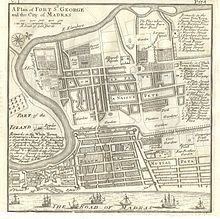Madras Synagogue
| Madras Synagogue | |
|---|---|
 Madras Synagogue Seal | |
| Religion | |
| Affiliation | Orthodox Judaism |
| Rite | Sephardic |
| Status | Active |
| Location | |
| Location | Madras, Tamil Nadu |
| Architecture | |
| Type | Synagogue |
| Completed | 1644 |
The Madras Synagogue is the only synagogue in Madras and it was built by Jacques (Jaime) de Paiva (Pavia) a Paradesi Jew of Madras. Madras Synagogue was also known as the Esnoga, or Snoge, Esnoga is synagogue in Ladino, the traditional Judaeo-Spanish language of Sephardic Jews.
The Amsterdam Sephardic community was among the richest Jewish communities in Europe during the Dutch Golden Age. They came to Madras for trading in Golconda diamonds, precious stones and corals, they developed very good relations with the rulers of Golkonda and maintained trade connections to Europe.
Stone inscription of the oldest synagogue in Tamil Nadu has been discovered near Valantharai near Ramanathapuram[1] This inscription dates back to the 13th century CE.
History[edit]



1600s The first Madras Synagogues and Cemeteries was built by Amsterdam Sephardic community in Coral Merchant Street, George Town, Madras, which had a large presence of Portuguese Jews in the seventeenth and eighteenth centuries. Neither the synagogue nor the Jewish population remains today.[2]
1644 The Second Madras Synagogue and Jewish Cemetery Chennai was built by Jacques (Jaime) de Paiva (Pavia) also from Amsterdam Sephardic community, in Peddanaickenpet, which later became the South end of Mint Street,[3]
1934 The Second Madras Synagogue and Jewish Cemetery Chennai was partly demolished by the local government and the tombstones were moved to the Central Park of Madras along with the gate of the cemetery on which Beit ha-Haim (the usual designation for a Jewish cemetery, literally "House of Life") were written in Hebrew.[4]
5 June 1968 Local government fully demolished the remaining Madras Synagogue and Jewish Cemetery Chennai and took over the land for building a government school, hence Rabbi Levi Salomon (Last rabbi of madras synagogue) died of Heart attack.[5][6] The remaining tombstones were moved opposite Kasimedu cemetery.
1983, The tombstones from Central Park of Madras and opposite Kasimedu cemetery were moved to Lloyds Road, when the Chennai Harbour expansion project was approved.[7] In this whole process 17 tombstones went missing, including that of Jacques (Jaime) de Paiva (Pavia).[8]
Present[edit]
After ISIS planned attack,[9] Madras Synagogue is at undisclosed location under custody of Isaac and Rosa Charitable Trust, Henriques De Castro family.
Henriques De Castro family has decided to handover everything to Archaeological Survey of India
Objects of antiquity[edit]
Madras Synagogue has eight Scrolls of the Law, several gold, silver and brass Antique Judaica Items.
Henriques De Castro family has decided to handover everything to Archaeological Survey of India
Image gallery[edit]
-
2 out of 8 Sefer Torah in 2nd Torah ark (or Aron Kodesh).
-
Silver Yad
-
Prayer book of Rabbi Salomon Halevi (Last Rabbi of Madras Synagogue)-8
-
Prayer book of Rabbi Salomon Halevi (Last Rabbi of Madras Synagogue)-10
-
Prayer book of Rabbi Salomon Halevi (Last Rabbi of Madras Synagogue)-11
-
Prayer book of Rabbi Salomon Halevi (Last Rabbi of Madras Synagogue)-12
-
Books from Madras Synagogue (1)
-
Books from Madras Synagogue (2)
-
Books from Madras Synagogue (2a)
-
Books from Madras Synagogue (3)
-
Shabbat Candlesticks
-
Handwashing cup for Handwashing in Judaism and Wine Cups for Kiddush
-
Hanukkah Menorah
-
Madras Synagogue Mezuzah
-
Madras Synagogue Office
-
Sefer Torah decoration jewels
-
Shabbat Secretary Desk
-
Silver and copper plates
-
Silver lining Challah cover
-
Silver Iteams and Shofar
-
Spice Besamim Box from madras synagogue
-
1873 Filigree Spice Besamim Box from madras synagogue
-
Jewish Maim Mayim Achronim for Netilat Yadayim , Hand Washing After Meal
-
Madras Synagogue Tefillin
References[edit]
Notes[edit]
Citations[edit]
- ^ "Stone Inscription of Oldest Synagogue in Tamil Nadu Found | Chennai News - Times of India". The Times of India.
- ^ Muthiah, S. (2004). Lakshmi, C. S. (ed.). The Unhurried City: Writings on Chennai. Penguin Books India. p. 30. ISBN 9780143030263. Retrieved 6 October 2018.
- ^ "The last family of Pardesi Jews in Madras « Madras Musings | We Care for Madras that is Chennai". 9 February 2018.
- ^ Arbell, Mordechai. "The Portuguese Jewish Community Of Madras, India, In The Seventeenth Century". Sefarad.org. Retrieved 6 October 2018.
- ^ "18th century Jewish cemetery lies in shambles, craves for attention". The New Indian Express.
- ^ "The Hindu : Will Chennai's Jews be there?". The Hindu. 12 March 2003. Archived from the original on 12 March 2003.
- ^ "18th century Jewish cemetery lies in shambles, craves for attention".
- ^ Sampath, Janani (10 May 2016). "Chennai's link to its Jewish past, cemetery in Mylapore fading into oblivion". DT Next. Archived from the original on 10 June 2016. Retrieved 6 October 2018.
- ^ "ISIS planned attack on Kodai Jews". 12 August 2017.
External links[edit]


























